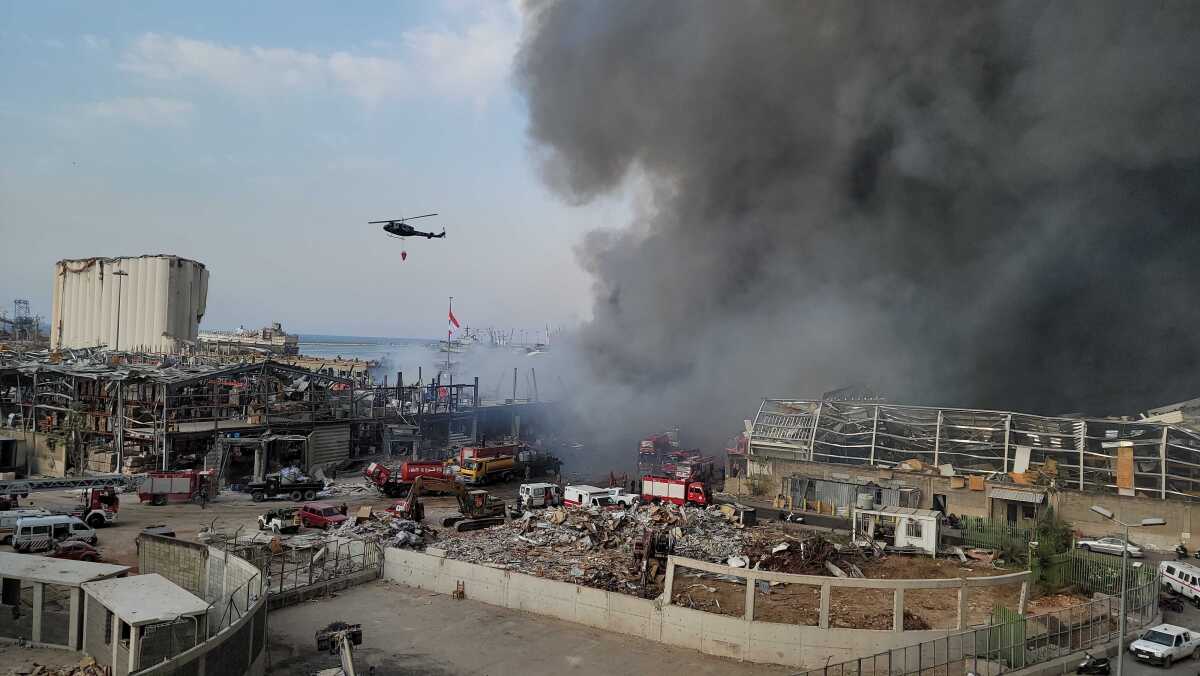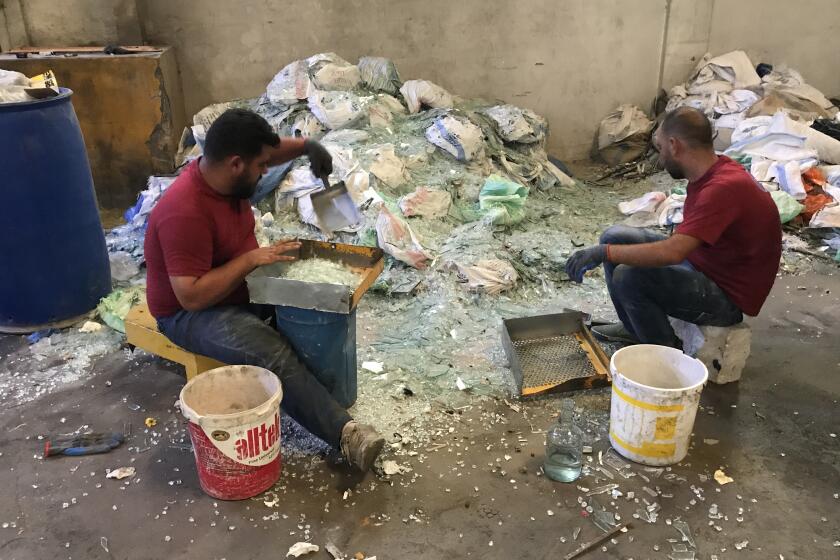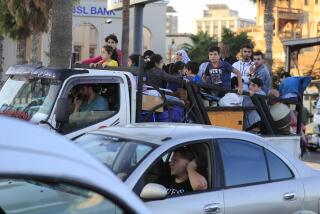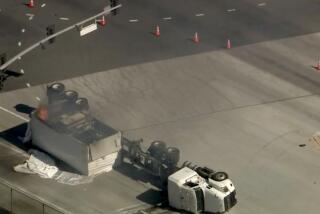Huge fire erupts in Beirut port a month after massive blast
Barely a month after the Beirut blast that killed nearly 200 people, another large fire erupted Thursday at the city’s port.
BEIRUT — A large fire broke out in Beirut’s port Thursday, filling the skies of the Lebanese capital with thick black smoke and raising fears of a repeat of the cataclysmic explosion that devastated large swaths of the city last month.
Raging flames engulfed a warehouse in the duty-free area of the port. The warehouse contained oil and tires, according to a statement by the Lebanese army.
Local media reported that the blaze had spread to an area containing clothes and food — essential items in a country in the throes of a currency crisis and where more than three-quarters of the population is expected to be below the poverty line in the coming year.
“Thousands” of food parcels and a type of oil were stocked in the burning warehouse, tweeted Fabrizio Carboni, regional director for the International Committee of the Red Cross.
“The extent of the damage still remains to be established. Our humanitarian operation risks to be seriously disrupted.”
Michel Murr, a spokesman for the fire department, said by telephone that the fire began after workers were cutting metal near the warehouse. Last month’s explosion is suspected to have been caused by materials catching fire after welding and maintenance work.
Marwan Abboud, Beirut’s governor, called on residents to stay away from the port’s environs and not obstruct the work of fire crews.
On Aug. 4, a stockpile of 2,755 tons of ammonium nitrate — a fertilizer that turns explosive when mixed with accelerants — detonated inside the port, killing nearly 200 people, injuring thousands and leaving hundreds of thousands without a home.
The fire on Thursday brought back unwelcome memories of that explosion. On social media, terrified residents shared videos of a column of smoke billowing over already-devastated neighborhoods. One video showed port workers running away from the blaze for fear of a repeat of last month’s blast.
Residents of Beirut hoping to rebuild homes and shops after the Aug. 4 blast are desperate for glass, even though fragments of it are everywhere.
An hour after the fire in the port began Thursday, traffic was snarled as panicked drivers sought to get away, even as others lined the highway near the port to get a closer view.
By midafternoon, hours after the blaze began, sirens and the whir of helicopters could still be heard over east Beirut, with a smoke column extending for miles, toward southern parts of the capital. Police cut off roads leading to the port as fire trucks barreled to the fire, leaving behind a snaking trail of flame-retardant foam on the highway.
Almost two dozen fire trucks were dispatched to combat the fire, said Gen. Raymond Khattar, head of Lebanon’s civil defense agency. He called on owners of private water tankers in the area to head to the fire zone to help replenish firefighters’ supplies but added that there was no fear of the fire expanding.
As darkness fell on Beirut, crews appeared to have gained control of the fire. Meanwhile, Lebanese President Michel Aoun and Caretaker Prime Minister Hassan Diab convened a meeting of Lebanon’s Supreme Defense Council.
“The fire today may have been an act of intentional sabotage or the result of technical error, ignorance or neglect, and in all cases the reason must be known as soon as possible and the perpetrators held accountable,” said Aoun in a statement posted on Twitter.
His point was echoed by Diab, whose government resigned in the wake of the August explosion amid large-scale protests.
“What happened at the port today,” he said, “no matter what its reasons may be, is like a new stab to all the Lebanese … and an insult to the state and society.”
On social media, furious commentators excoriated authorities for allowing another fire to begin at the port. “This is our sad reality now,” well-known satirist Karl Sharro tweeted above an image of Lebanon’s flag with its iconic cedar aflame.
For some residents, the new fire is the latest in a litany of disasters that have rendered the capital all but uninhabitable.
“I’ve lived in this neighborhood all my life. I’m fixing up my apartment now, but then I’m putting up a ‘for sale’ sign,” said Sleiman Makhoul, who lives in the east Beirut neighborhood of Geitawi.
Makhoul’s sixth-floor apartment was ravaged by the August blast, and he spent weeks repairing the damage. “Yesterday an explosion, today a fire. What will they do tomorrow? Enough,” he said.

Najat Saliba, an analytical chemist at the American University of Beirut, earlier in the day warned of the potentially toxic effects of the smoke column, adding that children and the elderly would be particularly vulnerable and should leave the city.
“Usually when a fire produces this type of smoke, it means you have black carbon as well as compounds ... that are highly carcinogenic,” Saliba said by telephone.
More to Read
Sign up for Essential California
The most important California stories and recommendations in your inbox every morning.
You may occasionally receive promotional content from the Los Angeles Times.












